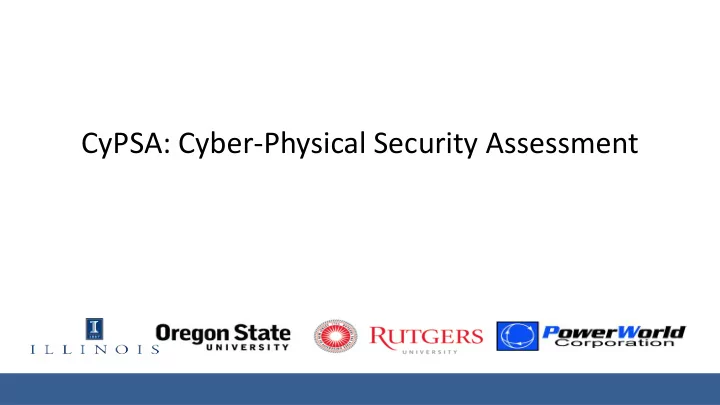

CyPSA: Cyber-Physical Security Assessment
Project Information • Team members • Based on two papers under TCIPG – UIUC : David Nicol, Pete Sauer, Kate Davis, Edmond Rogers, Robin Berthier, Olivier Soubigou, Gabe Weaver. – Zonouz, S., Davis, C. M., Davis, K. R., Berthier, R., – OSU : Panini Patapanchala, Vishnu Rayala, Rakesh Bobba, R. B., & Sanders, W. H. (2014). SOCCA: A Bobba security-oriented cyber-physical contingency analysis in power infrastructures . IEEE – Rutgers : Luis Garcia, Saman Zonouz Transactions on Smart Grid, 5(1), 3-13. PowerWorld : Matt Davis – Science of Security Significant Research in Cyber Security Citation Sponsor: ARPA-E • – Zonouz, S., Rogers, K. M., Berthier, R., Bobba, R. Duration: April 2013 – Aug 2016 • B., Sanders, W. H., & Overbye, T. J. (2012). SCPSE: Security-oriented cyber-physical state estimation for power grid critical infrastructures . Commercialization: Kaedago Inc. • IEEE Transactions on Smart Grid, 3(4), 1790-1799. 2
CyPSA Motivation • Power system operators and planners are constantly studying the system to gauge the effect of outages and changes on the system. Presently, outages caused by cyber failures or attacks are not considered • The purpose of this work is to build a framework that includes the physical and cyber systems so that the impact of cyber outages on the power system can be taken into account 3
Challenges How to ensure operational reliability given our increasing dependence on cyber systems? How to understand the impact of cyber vulnerabilities on grid operations? How to prioritize cyber security efforts in control networks and substations?
CyPSA streamlines a utility’s ability to inventory and analyze cyber-physical assets. 5
Target Application: Contingency Analysis Manually Define Automatically Insert Contingencies Contingencies Simulate Impact through a Power Flow State Estimator Rank contingencies by severity and prioritize mitigation response
Target Application: Contingency Analysis Manually Define Automatically Insert Contingencies Contingencies Simulate Impact through a Cyber-induced Power Flow State Estimator contingencies? Dependencies among cyber and Rank contingencies by severity and physical assets? prioritize mitigation response
Approach Combining cyber and power topologies to create a realistic model of the • infrastructure – cyber network topology + firewall rule-based attack graph generation – power system topology and power flow models Dividing the problem into manageable pieces • – cyber-side attack graph analysis (ease of penetration) – physical line outages/contingencies (impact of penetration) • Developing algorithms to compute potential attack paths and to assess risks accurately
CyPSA: Basic Pipeline CyPSA Toolset Vulnerability Information NP-View Cyber Physical • Compute connectivity • Generate attack paths Topology • Prune attack paths SOCCA Cyber Topology • Combine cyber attack Results Cyber-physical paths with power contingencies Interconnection • Rank asset by criticality Power Topology PowerWorld • Analyze contingencies
CyPSA Basic Pipeline Overview NP-View SOCCA on Zabbix CyPSA Web UI 1 3 2 PowerWorld
CyPSA Overview NP-View SOCCA on Zabbix CyPSA Web UI 1 3 2 PowerWorld 1. NP-View analyzes cyber-network and provides cyber vulnerability analysis attack paths XML file to SOCCA
CyPSA Overview NP-View SOCCA on Zabbix CyPSA Web UI 1 3 2 PowerWorld 2. SOCCA uses PowerWorld to calculate performance indices for all critical assets and then generates a cyber-physical attack path list ranked by security index
CyPSA Overview NP-View SOCCA on Zabbix CyPSA Web UI 1 3 2 PowerWorld 3. SOCCA sends the new cyber- physical attack graph to be displayed by the Web UI
CyPSA Data Interactions 14
CyPSA Control Panel 15
CyPSA Control Panel 16
Key Advantages • Accurate model of connections and dependencies of cyber and physical systems • What-if scenario analysis and prioritization of system-hardening and security patching efforts • Address the challenge of including cyber failures /attacks in contingency analysis
Benefits and Use Cases • For utility operators and utility planners : – Gain situational awareness on cyber systems • For security analysts : – Save time and effort in prioritizing security protection deployment • For auditors : – Improve understanding of the required scope of compliance efforts
Recommend
More recommend